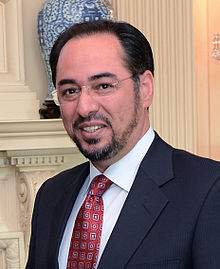Salahuddin Rabbani
Salahuddin Rabbani | |
|---|---|
 | |
| Minister of Foreign Affairs | |
| In office 1 February 2015 – 23 October 2019 | |
| President | Ashraf Ghani |
| Preceded by | Ahmad Moqbel Zarar |
| Succeeded by | Idrees Zaman (acting) |
| Chairman of the Afghan High Peace Council | |
| In office 15 April 2012 – 1 February 2015 | |
| President | Hamid Karzai Ashraf Ghani |
| Preceded by | Burhanuddin Rabbani |
| Succeeded by | Ahmed Gailani |
| Afghanistan Ambassador to Turkey | |
| In office 1 January 2011 – 14 April 2012 | |
| President | Hamid Karzai |
| Preceded by | Massoud Khalili |
| Succeeded by | Amanullah Jayhoon |
| Personal details | |
| Born | 10 May 1971 Kabul, Afghanistan |
| Political party | Jamiat-e Islami |
| Children | 5 |
| Parent |
|
| Alma mater | Kingston University, Columbia University |
| Profession | Diplomat |
Salāhuddīn Rabbānī (Persian/Pashto: صلاحالدین رباني; born 10 May 1971)[1][2] is an Afghan diplomat and politician who was the Minister of Foreign Affairs of Afghanistan from February 2015 to October 2019.
He was the Afghan ambassador to Turkey from 2011 to 2012. In April 2012, it was announced that he was to chair the Afghan High Peace Council in its negotiations with the Taliban.[3][4][5]
Early life
Salahuddin Rabbani was born on 10 May 1971[1] in Kabul, Afghanistan.[2] Salahuddin's father was former Afghan High Peace Council chairman and Afghan President Burhanuddin Rabbani.[3][5][4]
He received an undergraduate degree in management and marketing from the King Fahd University of Petroleum and Minerals in Saudi Arabia[2] in 1995.[1] In 2000, he received a Master's Degree in business management from Kingston University in the United Kingdom.[1] From 2006 until 2008, he attended Columbia University’s School of International and Public Affairs (SIPA) to earn an MA in international Affairs.[1]
Career
Private business and diplomacy
In the 1990s he worked in the financial accounting department of Saudi Aramco, and in 1996 he moved to the United Arab Emirates to work in the private sector.[1] After 2000 he joined Afghan Ministry of Foreign Affairs.[1] In that role, he served as the political counselor in New York to the Permanent Mission of Afghanistan to the United Nation.[3][1] HE worked on issues relating to the UN Security Council, and also was the representation of Afghanistan at the First Committee of the United Nations’ General Assembly on Disarmament and International Security.[1]
Around 2008, he moved from the United States to Afghanistan to serve as a political advisor to his father.[1]
Ambassador to Turkey
In 2010, Afghanistan appointed him their ambassador to Turkey,[1] and he was Ambassador to Turkey from 2011 to 2012.[3][4][5] He was selected as leader of the Jamiat-e Islami political party after the assassination of his father[1] on 20 September 2011.[6] He was ambassador from 1 January 2011 until 14 April 2012.[citation needed]
Afghan High Peace Council
After he was appointed to the role in March 2012,[1] in April 2012, it was announced that he was to chair the Afghan High Peace Council in its negotiations with the Taliban.[3][4][5] He was chairman from 15 April 2012 until 1 February 2015.[citation needed]
Foreign minister of Afghanistan
On 12 January 2015, he was nominated by President Ashraf Ghani as Minister of Foreign Affairs, replacing Ahmad Moqbel Zarar. He was confirmed by the Afghan Parliament on 28 January and was sworn in on 1 February.[1]
On March 21, 2017, he spoke at a meeting organised by the Atlantic Council think-tank in Washington, D.C..[7]
See also
References
- ^ a b c d e f g h i j k l m n "Salahuddin Rabbani". Afghanistan Embassy. Retrieved March 22, 2017.
- ^ a b c "Peace Council Salahuddin Rabbani from the University of King Fahd". BBC. April 14, 2012. Retrieved March 22, 2017.
- ^ a b c d e "Murdered Afghan talks head Rabbani replaced by son", BBC News, 14 April 2012.
- ^ a b c d "Son of former Afghan peace council chairman killed by suicide assassin takes charge of group", Washington Post, 14 April 2012. Archived 15 April 2012 at the Wayback Machine
- ^ a b c d "Karzai appoints slain leader's son to restart Afghanistan peace efforts", Miami Herald, 14 April 2012.[dead link]
- ^ "Afghan president assassinated". Aljazeera English. 20 September 2011.
- ^ "Pakistan's support for terrorism causes violence, says Afghanistan's Foreign Minister Salahuddin Rabbani", First Post, March 22, 2017, retrieved March 22, 2017
